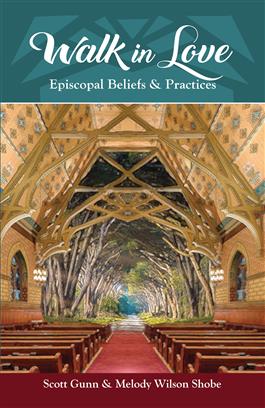Walk in Love: Episcopal Beliefs and Practices is a new book from Forward Movement – written by both the Revs. Melody Wilson Shobe (credited on this post) and Scott Gunn. This wonderful book is an excellent introduction to our faith tradition. The following short excerpt is from chapter one: “Not Only with Our Lips, But in Our Lives.” – ed.
Prayer is a full-contact sport. Prayer is not just a matter of the mind or the mouth—it is a matter of the whole body. It is meant to involve every part of ourselves. We live out that reality in worship by the different actions we use when we pray. The Book of Common Prayer sometimes directs us to sit, sometimes to stand, sometimes to kneel. Sometimes we are told to speak, sometimes to remain silent, other times to sing. Some people even include actions: crossing themselves at certain moments, bowing their heads at the name of Jesus, and genuflecting (dropping to one knee in reverence) before the altar. The different actions can make it seem like we aren’t engaged in prayer but rather Episcopal aerobics! The truth is that these different actions and postures of prayer help us to engage our whole selves in worship. They are ways of living out the truth that we praise God “not only with our lips, but in our lives.”
By actively engaging our bodies in prayer, we acknowledge that prayer demands more than just our words. We proclaim in our actions that God wants all of us—and that we are offering all of ourselves to God.

Our actions and our motions are only part of our prayers; worship involves all of the senses. In worship, we see light and darkness as candles flicker, and we see the variety of colors in changing vestments, church hangings, and stained glass windows. We hear music sung or played and words spoken and chanted, and we experience silence that tells its own story. We smell the beeswax of burning candles, the holy perfume of incense, the beautiful scent of anointing oil. We taste the bread and wine. And we touch: the smooth surface of altar rails, the thin pages of prayer books and hymnals, the hands of our neighbors and strangers. Our worship engages all of our selves: our bodies and souls, our mouths and our movements. And it engages all of our senses: sight, hearing,
taste, touch, and smell. Our prayer is embodied action.
This tenet extends beyond our worship. Praising God “not only with our lips, but in our lives” means that our prayers must shape the way we live, not only for an hour on Sunday but also for every hour of every day of every week for our entire lives. We don’t just involve our bodies in worship on Sunday by kneeling or standing, smelling and tasting. We involve our bodies in worship every day, by living in our lives what our lips profess in prayer. Praising God involves more than just the prayers we say or the things we believe; it includes the way we practice our faith on a daily basis.
[Looking for more? The whole book is available here. – ed.]
What is one connection you make between your prayers and your whole life?
Discover more from Grow Christians
Subscribe to get the latest posts sent to your email.
I purchased 6 to give to members of the church, just on Easter one of the women I gave the book to told me her reading on Holy Week really enriched Easter for her and her family.